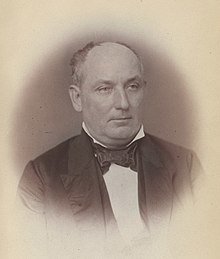James H. Hammond | |
|---|---|
 | |
| United States Senator from South Carolina | |
| In office December 7, 1857 – November 11, 1860 | |
| Preceded by | Andrew Butler |
| Succeeded by | Frederick A. Sawyer (1868) |
| 60th Governor of South Carolina | |
| In office December 8, 1842 – December 7, 1844 | |
| Lieutenant | Issac Witherspoon |
| Preceded by | John Peter Richardson II |
| Succeeded by | William Aiken Jr. |
| Member of the U.S. House of Representatives from South Carolina's 4th district | |
| In office March 4, 1835 – February 26, 1836 | |
| Preceded by | John Felder |
| Succeeded by | Franklin H. Elmore |
| Personal details | |
| Born | James Henry Hammond November 15, 1807 Newberry County, South Carolina, U.S. |
| Died | November 13, 1864 (aged 56) Beech Island, South Carolina, C.S. |
| Political party | Nullifier (before 1839) Democratic (1842–1864) |
| Spouse | Catherine Fitzsimmons |
| Education | University of South Carolina, Columbia (BA) |
James Henry Hammond (November 15, 1807 – November 13, 1864) was an American attorney, politician, and planter. He served as a United States representative from 1835 to 1836, the 60th Governor of South Carolina from 1842 to 1844, and a United States senator from 1857 to 1860. An enslaver, Hammond was one of the most ardent supporters of slavery in the years before the American Civil War.
Acquiring property through marriage, Hammond ultimately owned 22 square miles, several plantations and houses, and enslaved more than 300 people.[1][2] Through his wife's family, he was a brother-in-law of Wade Hampton II and uncle to his children, including Wade Hampton III. When the senior Hampton learned that Hammond had raped his four Hampton nieces as teenagers, he made the scandal public. The publicizing of his crimes nearly derailed Hammond's career, but he later was elected to the United States Senate.[1]
- ^ a b Cite error: The named reference
brownwas invoked but never defined (see the help page). - ^ Weil, Julie Zauzmer (10 January 2022). "More than 1,800 congressmen once enslaved Black people. This is who they were, and how they shaped the nation". Washington Post. Retrieved 5 May 2024. Database at "Congress slaveowners", The Washington Post, 2022-01-13, retrieved 2024-04-29